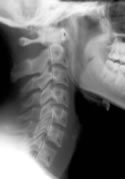 The latest scientific research on whiplash injuries shows that automobile collisions can cause ligament damage to the cervical and lumbar spine. Numerous studies have shown that zygapophysial facet joints can be stretched during a rear end collision, and recent studies have shown injury to the anterior longitudinal ligament and the transverse ligament.
The latest scientific research on whiplash injuries shows that automobile collisions can cause ligament damage to the cervical and lumbar spine. Numerous studies have shown that zygapophysial facet joints can be stretched during a rear end collision, and recent studies have shown injury to the anterior longitudinal ligament and the transverse ligament.
Identifying these ligamentous injuries, however, can be difficult. The ligaments themselves may be detected on MRI, but they cannot be seen on normal radiographs. It is more likely that the ligament injury will result in changes to the alignment of the cervical spine, and that can be detected with plain films.
A 2002 study1 compared the angle of cervical lordosis between whiplash patients and healthy controls. They found a statistically significant difference between the two groups, suggesting that whiplash injuries may indeed alter cervical spine alignment.
Now, a new study2 has shown that chiropractic treatment can improve cervical lordosis in patients after a motor vehicle collision.
The authors of this current study began with 13 patients who had been in a car crash. They obtained a neutral cervical radiograph taken in the natural standing position. Then, each patient was treated by a chiropractor. The patients had an average age of 24, and the average number of chiropractic adjustments was 17.7.
Eleven of the thirteen patients also did light stretching at home.
After a period of care, neutral radiographs were again taken, and both the pre- and post-treatment films were evaluated by a second chiropractor who was blinded to which films belonged to which patient.
The cervical curve was measured in each of the x-rays.
The authors found the following:
10 of the 13 patients showed an increase in the cervical lordosis found on x-ray. The average increase found in the patients was 6.4°.
One patient showed no change and two patients showed a decrease in cervical lordosis.
This study suggests that chiropractic adjustments do indeed increase cervical lordosis, which may be helpful for patients suffering from auto injuries. The sample size in this study was small, and the authors stress the need for further study into this matter.
- Kristjansson E, Jonsson H. Is the sagittal configuration of the cervical spine changed in women with chronic whiplash syndrome? A comparative computer-assisted radiographic assessment. Journal of Manipulative and Physiological Therapeutics 2002;25(9):550-555.
- Coleman RR, Hagen JO, Troyanovich SJ, Plaugher G. Lateral cervical curve changes in patients receiving chiropractic care after a motor vehicle collision: a retrospective case series. Journal of Manipulative and Physiological Therapeutics 2003;26(6):352-355.